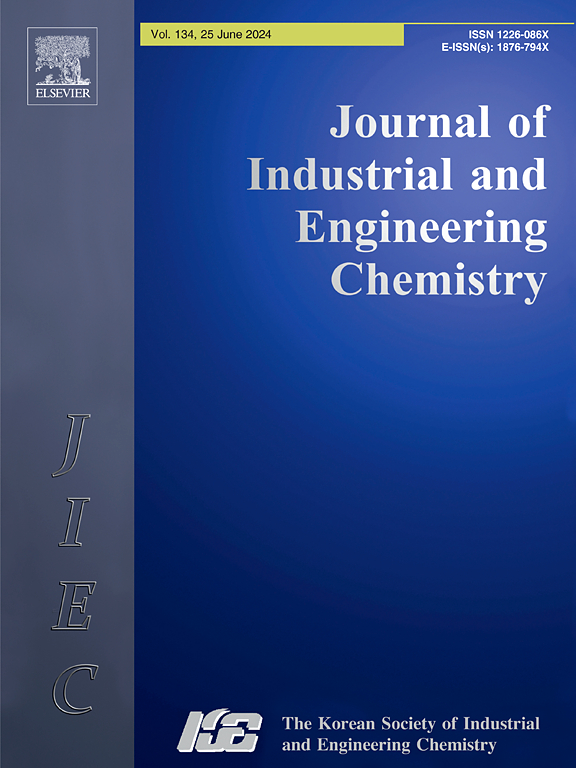用于氯离子电池的具有高倍率性能的镍铁合金 LDH 纳米片阴极的层间间距调节技术
IF 5.9
3区 工程技术
Q1 CHEMISTRY, MULTIDISCIPLINARY
Journal of Industrial and Engineering Chemistry
Pub Date : 2024-08-21
DOI:10.1016/j.jiec.2024.08.021
引用次数: 0
摘要
氯化物离子电池(CIBs)具有理论体积能量密度高、前驱体资源丰富以及无树枝状晶粒特性带来的高安全性等多重优势,为电化学储能提供了更多的选择和机会。本研究采用简单的共沉淀法制备了不同层间距的镍铁合金 LDH 纳米片,LDH 纳米片的层间距从 7.695 Å 扩展到 24.114 Å。此外,随着层间距的增加,镍铁合金 LDH 纳米片阴极与溶剂 PC 之间的疏油性也增加了,这有利于材料在循环过程中的结构稳定性。与典型的氯离子电镀镍铁合金 LDH 纳米片相比,具有最大层间间隔的镍铁合金-CHO LDH 在高电流密度和良好的速率性能条件下,性能提高了约 213%(200 次循环后的放电比容量为 64.2 mAh/g)。这项研究为高电流密度下的 CIB 阴极设计提供了一种简单有效的层间间距控制策略。本文章由计算机程序翻译,如有差异,请以英文原文为准。

Interlayer-spacing regulation of NiFe LDH nanosheets cathode with high rate performance for chloride ion battery
Chloride ion batteries (CIBs) possess the multiple advantages of high theoretical volumetric energy density, abundant precursor resources and high safety due to the dendrit-free characteristic, which provide more choices and opportunities for electrochemical energy storage. In this work, NiFe LDH nanosheets with different interlayer spacing are prepared using a simple co-precipitation method with the interlayer spacing of LDH nanosheets extended from 7.695 Å to 24.114 Å. Expanding interlayer space of LDHs nanoplates helps to the promote ion diffusion and enhance their action kinetics. Additionally, the increased oleophobicity between NiFe LDH nanosheets cathode with increased interlayer spacing and solvent PC is beneficial for the structural stability of the materials during cycling. Compared with typical chloride ion-intercalated NiFe LDH nanosheets, the NiFe-C17H25O3 LDH with the maximum interlayer spacing demonstrates a performance improvement of about 213 % (with a discharge specific capacity of 64.2 mAh/g after 200 cycles) at high current density and good rate performance. This work provides a simple and effective interlayer spacing control strategy for the design of CIBs cathodes under high current density.
求助全文
通过发布文献求助,成功后即可免费获取论文全文。
去求助
来源期刊
CiteScore
10.40
自引率
6.60%
发文量
639
审稿时长
29 days
期刊介绍:
Journal of Industrial and Engineering Chemistry is published monthly in English by the Korean Society of Industrial and Engineering Chemistry. JIEC brings together multidisciplinary interests in one journal and is to disseminate information on all aspects of research and development in industrial and engineering chemistry. Contributions in the form of research articles, short communications, notes and reviews are considered for publication. The editors welcome original contributions that have not been and are not to be published elsewhere. Instruction to authors and a manuscript submissions form are printed at the end of each issue. Bulk reprints of individual articles can be ordered. This publication is partially supported by Korea Research Foundation and the Korean Federation of Science and Technology Societies.

 求助内容:
求助内容: 应助结果提醒方式:
应助结果提醒方式:


